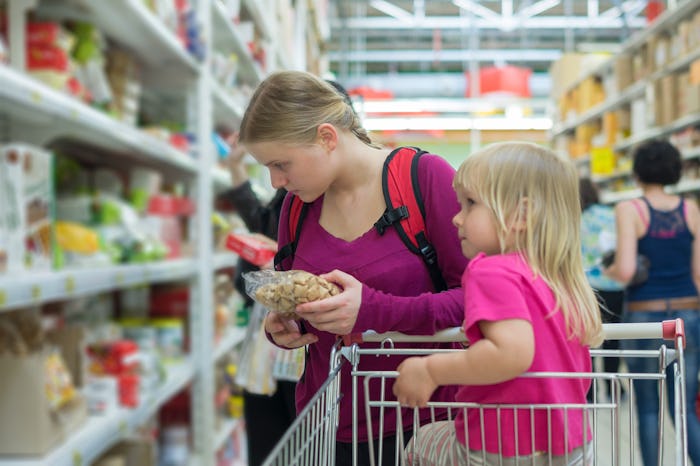Life

What You Actually Need For Coronavirus Home Quarantines, According To 2 Doctors & A Prepper
The idea of lining up at the checkout with a cart packed unapologetically high is nothing to parents who do it weekly (what’s new?), but the threat of forced sequestration in our homes, with our children, thanks to the COVID-19 pandemic, mean it’s worth considering exactly what you might put on your coronavirus outbreak shopping list. The number one thing to keep in mind? Take precautions, but don’t panic. We talked to two doctors and a prepper to find out what it truly makes sense to have on hand.
Before running to the store to stock up in case of a quarantine, the Centers for Disease Control and Prevention (CDC) recommends knowing the signs and symptoms of COVID-19, the virus caused by coronavirus, to help stop the spread in the first place. Dr. Latasha Perkins, M.D., a family physician in Washington, D.C., says the coronavirus has symptoms similar to other viruses. "The top three symptoms are fever, cough, and shortness of breath, which mock cold and flu symptoms," she tells Romper. If you have any of these symptoms, see your health care provider — if you do test positive for COVID-19, you'll probably be quarantined to your house.
Other reasons you might be at home include school closings, or if your company decides people should work from home for a period of time. Or, you may need (or decide) to stay home to avoid crowds and minimize your risk. Perkins says you can prepare your home much in the same way you'd prepare yourself for a natural disaster like a hurricane. Just don't forget the wine!
1Nutritious Non-Perishables & Comfort Foods
Kathy Harrison, author of Prepping 101 and Just In Case tells Romper, "Stock up on non-perishable food and beverages, and don't forget comfort food like coffee, snacks, and wine."
In addition to comfort food, Dr. Mary Mason, M.D., board-certified physician in internal medicine, says, "I think it is always a good idea to be prepared and have a well-stocked pantry with good, nutritious food that has a good shelf life." She recommends a variety of canned goods, like beans, vegetables, fruits, and tuna, along with some dried grains and nuts.
2Prescriptions & OTC Medications
The U.S. Surgeon General has asked the general public NOT to buy surgical masks. But, Perkins tells us it does make sense to make sure you have your prescriptions filled, and basic over-the-counter medication like ibuprofen, Motrin for kids, vitamins, etc., on hand. Mason says it's especially important to keep Tylenol or ibuprofen in stock in case anyone comes down with a fever.
3Pet Food & Supplies
Harrison reminds us to not forget about the pet food! Your fur babies need to eat, too.
As a general rule, the CDC recommends getting enough food and water for at least two weeks per pet. Don't forget kitty litter for cats and plastic poop bags for dogs!
4Bathroom Essentials
"A good supply of hand soap, alcohol-based hand sanitizer (at least 60 percent), and tissues is recommended," Mason says. In case you don't have soap available, or if you run out, hand sanitizer is the recommended alternative. It's crucial to wash your hands to help avoid getting yourself or other people sick.
"Think about having antibacterial soap and wipes on hand to ensure proper hand-washing and to keep everything clean to help you stay healthy or get better quickly," Perkins says. It also doesn't hurt to have plenty of tissues (sneeze into them and throw them out!) and even some disposable gloves in case you find yourself taking care of a sick family member.
Another thing you definitely don't want to run out of is toilet paper. We don't need to explain that one...
5First Aid Kit
The CDC recommends having a first aid kit on hand that includes non-latex gloves, a thermometer, tweezers and scissors, waterproof bandages and gauze, and a digital thermometer.
The American Red Cross also suggests going beyond standard first-aid by putting emergency phone numbers plus disposable gloves and a spare blanket in your kit.
6Kid-Related Items
"For parents, make sure you have baby food, formula, and diapers for your kids. Think about your basic needs and make sure you have those items," Perkins says.
For older children, if school is closed or they're stuck at home for any reason, make sure you have what you need to play board games or indoor activities, do art projects, bake, or even conduct some homemade science experiments. If all else fails, queue up Disney+ and pop some popcorn.
7
While stocking up can help minimize those weekly (sometimes every-other-daily) trips to Target, there's no need to buy months' worth of supplies. "We should think more about how to minimize the spread of viral illnesses instead of stockpiling materials," says Perkins. "If you're not feeling well, consider staying home and resting, and send someone else out to pick up must-have items so you can prevent the spread and get better."
8
If you think you’re showing symptoms of coronavirus, which include fever, shortness of breath, and cough, call your doctor before going to get tested. If you’re anxious about the virus’s spread in your community, visit the CDC for up-to-date information and resources, or seek out mental health support. You can find all of Romper’s parents + coronavirus coverage here, and Bustle’s constantly updated, general “what to know about coronavirus” here.
Experts:
Dr. Latasha Perkins, M.D., a family physician in Washington, D.C.
Dr. Mary Mason, M.D., board-certified medical internist and founder of Little Medical School
Kathy Harrison, author of Prepping 101 and Just In Case
This article was originally published on